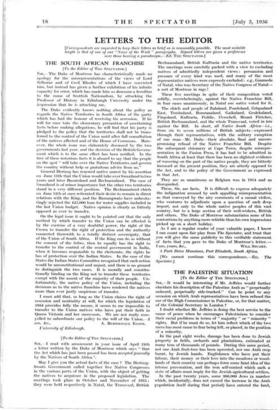[To the Editor of TIIE SPECTATOR.] read with amazement in
your issue of April 24th a letter written by the Duke of Montrose which says " that the Act which has just been passed has been accepted generally by the Natives of South Africa ".
May I give you the actual facts of the case ? The Hertzog- Smuts Government called together five Native Congresses in the various parts of the Union, with the object of getting the natives to acquiesce in the proposed legislation. The meetings took place in October and November of 1935. : they were held respectively in Natal, the Transvaal, British
Bechuanaland, British Kaffraria and the native territories. The meetings were carefully packed with a view to excluding natives of admittedly independent views : persuasion and pressure of every kind was used, and many of the most representative natives were expressly excluded : e.g., Gunmede of Natal, who was Secretary of the Native Congress of Natal— a sort of Montrose in rags !
These five meetings in spite of their composition voted solidly, overwhelmingly, against the Native Franchise Bill, in four cases unanimously, in Natal one native voted for it.
The chiefs and people of Zululand, Pondoland, Griqualand East, Tembuland, Bomranaland, Gaikaland, Gcalekaland, Fingoland, Kaffraria, Peddie, Herschel!, .Mount Fletcher, British Bechuanaland, and the whole Transvaal, voted in Coto against the Bill. In short, all Native South Africa—i.e., from six to seven millions of British subjects—expressed through their representatives, with the solitary exception of one man—Mr. Dube—their absolute, final and uncom- promising refusal of the Native Franchise Bill. Despite the subsequent chicanery at Cape Town, despite misrepre- sentation in the Fusion Press, it has had to be admitted in South Africa at least that there has been no slightest evidence of wavering on the part of the native people, they are bitterly incensed at the present position, they are utterly opposed to the Act, and to the policy of the Government as expressed in that Act.
They arc as unanimous as Belgium was in 1914 and as disregarded.
These, Sir, are facts. It is difficult to express adequately the indignation aroused by such appalling misrepresentation as that conveyed by the airy comments of a casual visitor, who ventures to adjudicate upon a question of such deep import, not only to the whole native peoples of this vast country, but to a large section of their well-wishers, British and others. The Duke of Montrose substantiates none of his contentions by anything more reliable than his own impressions picked up on a short holiday.
As I am a regular reader of your valuable paper, I know I can count upon fair play from The Spectator, and trust that you will give the same publicity to this verifiable statement of facts that you gave to the Duke of Montrose's letter.— [We cannot continue this correspondence.—En. , The Spectator.]














































 Previous page
Previous page